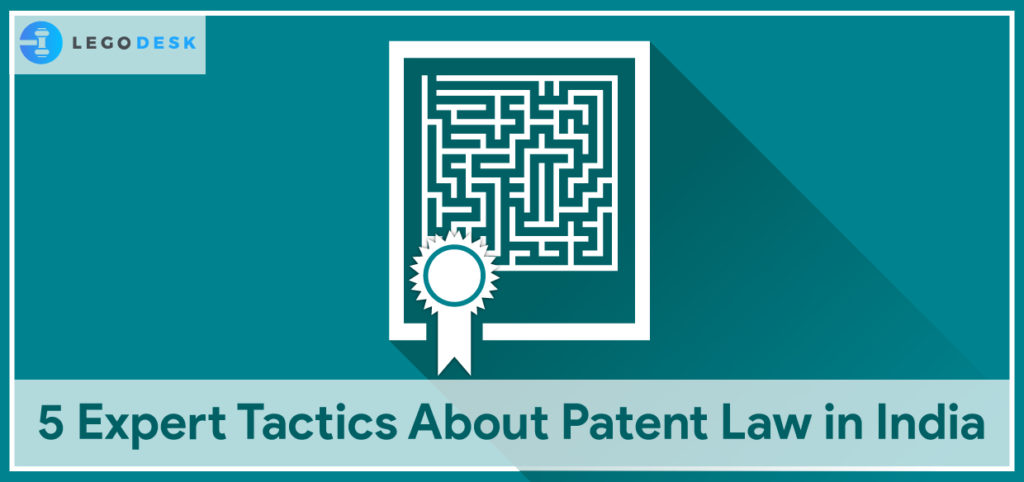5 Expert tactics about patent law in India

Introduction To Patent Law in India
The law of patents, governed under the Indian Patent Act, 1970, is a very complex piece of legislation. In addition to governing among the more technical branches of intellectual property, patents, patent law also boasts a complex administrative structure for implementation which you will see hereinbelow.
As you will see, protection of patents does not end with the grant of the patent, it continues till the end of maximum term – with post-grant, revocation and compulsory licensing provisions ensuring that the patentee does not get lax in the working of the patent at any point of time. For this article, we shall discuss some of the peculiarities about the patent law in India, of which there are many.
Read Also: What is a Patent Application?
Expert tactics about the Patent Law in India
-
Supplementary protection certificates
The maximum term for protection of the patent under the Indian Patent Act, 1970 is 20 years. This term has been agreed upon within the scope of the Trade-Related Aspects of Intellectual Property Rights (“TRIPS”). The provisions for Supplementary Protection certificates is, as the term reveals, for the extension of such protection beyond this maximum period of protection. India presently does not have any provision under the patent law, including of supplementary protection certificates that allow for protection of technical intellectual property rights beyond their maximum terms.
-
Pre-grant opposition proceedings
An expert tactic in expediting patent grant proceedings is to file for pre-grant proceedings under patent law, section 25. Pre-grant proceedings are done about after the filing for a ‘request for examination’ by “any person.” The Controller of Patents will discern whether such a request must be entertained. If s/he is of the opinion that it should, then a notice is given to the applicant to produce the necessary evidence within 3 months of the notice. The Controller’s decision is given upon appropriate opportunity of a hearing. If such a decision is adverse to the applicant, an appeal can be filed with the Intellectual Property Appellate Board. However, if no such opposition is filed, then the patent shall be granted within 2 months within the date of publication.
-
Renewal Fees
Even after the grant of the patent, the patentee still has to regularly renew the patent rights by paying renewal fees in order to enjoy the patent rights under the patent law. The patentee shall pay the fees within the prescribed time, or the allowable extension.
The allowable extension is 18 months from the date of cessation upon non-renewal under the patent law. Notably, an expert tactic is that if you pay the fees within the first 6 months you can avoid stating reasons as to the delay, so you just file for restoration and pay the fees, however, if you pay in the next 12 months then you have to file for restoration, pay the fees, and state the reasons as to the delay. Only if reasons are justified, the fact of restoration is published.
-
Commercial Suits Act
Important expert tactics lie in the way you remedy infringement of the patentee rights. Under patent law, the patentee only has civil remedies, not criminal. Civil remedies are as mandated under the TRIPS Agreement: Damages; injunction; seizure, forfeiture, destruction of infringing products. Civil remedies also include payment of costs, such as lawyer’s fees and costs incurred by winning party during adjudication. Remedies are sought for in the first instance under the District Court.
However, the Commercial Courts, Commercial Division and Commercial Appellate Division of High Court Act, 2015 was enacted to expedite judicial processes with regards to suits valued above USD 4200. The term ‘commercial suits’ include intellectual property matters. This is a very interesting development with regards to the judicial machinery governing intellectual property rights. Additionally, the High Courts of Delhi, Bombay, Madras, and Calcutta can entertain intellectual property matters under original jurisdiction. Otherwise, in cases of infringement proceedings if the defendant files a counterclaim challenging the validity of the patent, then the matter is transferred to the High Court for further adjudication. The Intellectual Property Appellate Board entertains appeals from decisions of Controller of Patents.
Caveat petition can also be filed under section 148(A) of the Code of Civil Procedure to stop the potential infringement of patent rights. It states that no hearing or order should be passed without giving notice to the party. This is also used to prevent ex-parte ad interim injunction in intellectual property matters.
-
Gillette defense
Finally, an interesting defense was incorporated into patent law as part of the decision in Hindustan Lever Ltd. v. Godrej Soaps Ltd.: incorporation of the ‘Gillette defense.’ It states that the act of the defendant was merely one disclosed in a prior publication. This puts the plaintiff in a difficult position as it gives him/her two choices, either to continue with infringement proceedings implying that the prior publication discloses the patented invention, i.e., there is no substantial or patentable variation thereby bringing to question the prima facie validity of the patent or to claim non-infringement. This is also another important expert tactic about patent law.
Conclusion
Parallel proceedings and claim construction tactics as laid down in Merck Sharpe & Dohme Corp. v. Glenmark, where it has been held that claims should be read literally and in cases of ambiguity the complete specifications are to be referred to, are also important in the scheme of patent law. Therefore, it is also clear to see that there are plenty of new aspects of patent law in India that makes it incredibly organic in its growth.
Try our Debt Resolution solutions today Request a Demo